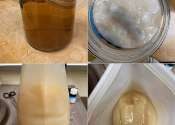Food scientists show rice malt has potential to play a bigger role in beer
Rice is showing potential to play a more prominent role in beer brewing, and it helps that Arkansas produces a lot of it.

Rice is showing potential to play a more prominent role in beer brewing, and it helps that Arkansas produces a lot of it.
Molecular & Computational biology
Mar 30, 2024
0
13

Kombucha is a fermented tea known for its health benefits and tangy kick. But brewers can find it challenging to keep kombucha's alcohol levels low because the bacteria and yeast used in the fermentation process vary from ...
Biochemistry
Mar 17, 2024
0
6

Traditional Chinese rice wine (RW) has been popular in China for thousands of years. The brewing process involves simultaneous saccharification and solid-state fermentation using mixed saccharifying starters, such as wheat ...
Biotechnology
Jan 2, 2024
0
1

Beer is the most consumed beverage in the world after water and tea, and beer brewing generates large amounts of grain waste, which today has a low value. But now a research project at the University of Borås, Sweden, shows ...
Biotechnology
Jun 26, 2023
0
2

Without barley, hops and yeast, there is no beer. Brewing specialist Dr. Martin Zarnkow and beverage microbiologist Dr. Mathias Hutzler believe that a very special yeast variety might be found in Georgia. So they embarked ...
Ecology
Jan 20, 2023
0
18

Even though sales of non-alcoholic beer have risen substantially in Denmark and Europe in the last couple of years, there are still many people that won't follow the healthy trend because they find the taste not to be quite ...
Biotechnology
Feb 11, 2022
1
1285

The 200-year-old malting barley variety 'Chevalier' was for a long time world-leading in beer brewing and is thought to have originated from a single plant. In a new study, Swedish researchers from the universities of Linköping ...
Evolution
Jan 18, 2022
0
5

People have been making beer for thousands of years, and we have amassed a tremendous amount of knowledge on how to do it well. Over time, the art of brewing has evolved into a science that encompasses chemistry, microbiology ...
Other
Mar 10, 2021
1
7

A Ph.D. student and 'beer scientist' has inadvertently discovered a way to conduct extremely small-scale brewing experiments, potentially leading to better beer.
Other
Jan 28, 2021
0
354

Mathematicians, physicists, and materials experts might not spring to mind as the first people to consult about whether you are brewing your coffee right. But a team of such researchers from around the globe—the United ...
Mathematics
Jan 22, 2020
0
1868